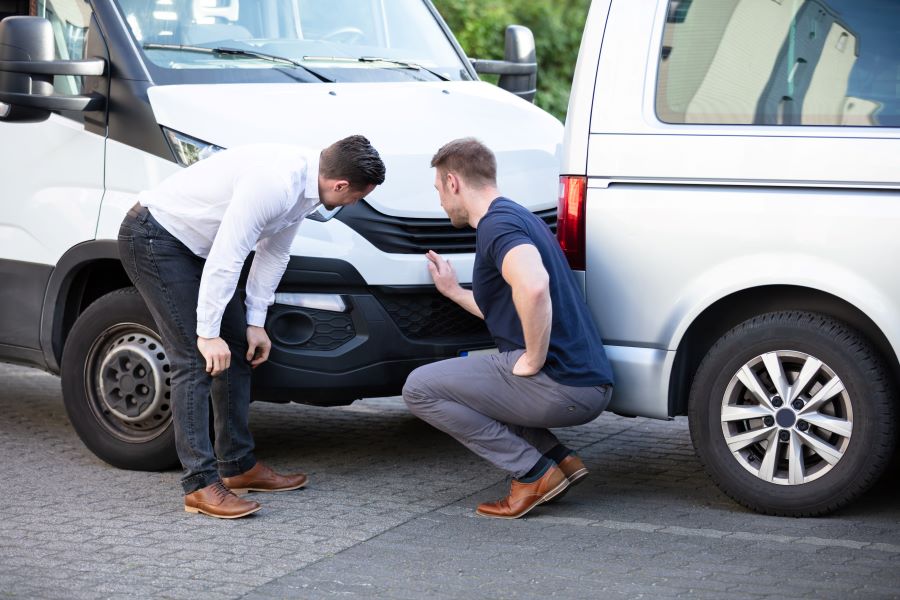If you run a business that relies on transportation, finding cheap van insurance is crucial to cut costs and keep your business profitable. Van insurance is a legal requirement in the UK, but many different types of coverage depend on your needs. Whether you use your van for commercial purposes, transport tools, or as a courier, finding the right insurance cover can give you peace of mind and protect you against unexpected costs. To get the best deal on your van insurance, it’s essential to shop around and understand the factors that can affect your insurance quote. With so many insurance providers and policies available, it can be challenging to know where to start. But by taking the time to research the options and compare prices, you can significantly save your insurance costs while still ensuring you have the right level of coverage for your business needs. In this article, we’ll explore how to get cheap van insurance and the different types of coverage available to help you make an informed decision and save money on your insurance premiums.
What is Van Insurance?
Van insurance is a type of policy that protects drivers from the financial risks associated with an accident or theft. Whether it’s a private or commercial vehicle, van owners are legally required to have insurance that covers third-party damage or injury. Choosing the right van insurance can be challenging, especially when keeping costs down. But as a driver, it’s essential to have adequate coverage that covers your vehicle and any third-party damage. This article explores how to get cheap van insurance and reduce insurance costs. We’ll discuss different types of coverage and how you can get discounts to save money without compromising on coverage.
The Benefits of Shopping Around for Cheap Van Insurance
When seeking cheap van insurance, comparing quotes from different providers is key. Costs vary widely across companies, and the level of coverage offered in each policy is also different. By comparing quotes, individuals can ensure they get the best coverage at the most affordable price.
Using a comparison website can simplify obtaining quotes from different providers. These sites streamline insurance shopping by presenting individuals with various policies and prices.
It’s essential to acknowledge that different providers offer various levels of coverage, meaning it’s important to assess each quote’s details. This assessment should include examining the policy’s excess, the level of cover provided, and any optional extras offered.
In summary, shopping around and comparing quotes from different providers is beneficial when seeking cheap van insurance. Doing so can ensure individuals get the coverage they require at a price that fits within their budget.
Types of Van Insurance
Van insurance is a requisite for vehicle owners who wish to drive legally on UK roads. It is a legal requirement under the Road Traffic Act. There are different types of van insurance, and selecting the right one can save you lots of money. This article will provide an overview of the various van insurance policies available. By understanding these policies, you can make an informed decision and select the one that meets your needs.
Comprehensive Cover
Comprehensive coverage is a type of insurance policy that provides the most extensive coverage for your van compared to other types. It covers third-party damage and offers additional protection against accidental damage to your van and personal injury for you and other passengers.
Comprehensive cover is ideal for those who want maximum protection for their van. If you are involved in an accident, this policy will cover the cost of damage to your van and expenses associated with injuries, medical bills, and property damage.
Aside from the extensive coverage, comprehensive coverage offers additional benefits, such as a courtesy car. At the same time, yours is being repaired and legal expenses, providing peace of mind as you do your business.
While the comprehensive cover may cost more than other types, it offers greater protection, which is why it is a popular choice for many van owners. When considering van insurance, compare the coverage and rates of different insurance providers to find the best deal for your needs and budget.
Third-Party Fire and Theft Cover
Third-Party Fire and Theft Cover is an insurance policy that protects your vehicle against third-party liability, fire damage, and theft. This policy offers protection between basic third-party liability cover and comprehensive coverage.
Third-Party Fire and Theft Cover protects against fire damage and theft, unlike third-party liability cover. This means that if your van is stolen or damaged by fire, you will be covered for the cost of repairs or replacement.
In addition to the basic coverage, Third Party Fire and Theft policies also offer optional extras such as coverage for transport tools and goods and a no-claims bonus that discounts your premiums if you don’t make any claims during the policy period.
Overall, Third Party Fire and Theft Cover provides good protection for those who want more than just third-party liability coverage but is not as comprehensive as a comprehensive policy. It is important to note that this policy may not provide adequate coverage for those who use their van for commercial purposes.
Third-Party Only Cover
Third-Party Only van insurance is the minimum level of cover required by law in the UK for all van owners. This policy only covers the damage and injury caused to other people or their property and does not cover damages to the driver’s van.
The coverage included in Third Party Only policies has liability for passenger injury and damage to a third-party caravan or trailer. This means that in case of an accident, the insurance company will cover the costs of the repairs needed for the other party’s vehicle, injury claims, and damage to their property. However, the policyholder will have to cover the costs of repairs for their van.
Although Third Party Only insurance is the cheapest option available, it is unsuitable for all drivers. It is recommended for individuals who own an older van or use it for personal use but not for those who use it for business purposes.
In conclusion, while Third Party Only van insurance is a legal requirement for all van owners in the UK, it is important to consider additional coverage options to ensure that you are adequately protected in case of an accident.
Factors that Affect Your Van Insurance Quote
When looking for van insurance, it’s important to understand that the price you pay for your policy is not fixed. Your premium is calculated based on several factors that can influence the level of risk you pose to the insurer. Understanding these factors can help you make changes to reduce your insurance costs and get a cheaper van insurance policy. Here are some of the main factors that affect your van insurance quote.
Age and Driving History of the Driver
Regarding van insurance, age and driving history can significantly impact the cost of coverage. Younger drivers, particularly those under 25, are often considered at higher risk due to their lack of driving experience. As a result, they may pay more for insurance.
Furthermore, those with a poor driving history or previous driving convictions, such as penalty points, are also considered higher-risk clients. Insurance companies may view these drivers as more likely to be involved in accidents or make claims, resulting in higher insurance costs.
To mitigate these costs, younger drivers may be able to take advantage of certain discounts, such as those for completing a driver training course or having a good academic record. Drivers with penalty points or previous convictions may need to seek out specialist insurance providers that cater to high-risk clients.
Ultimately, drivers of any age can take steps to keep their insurance costs down. This includes selecting insurance that meets one’s needs without being excessive, considering the amount of annual mileage driven, and securing the van with extra security measures to reduce the theft risk.
Type of Vehicle and Size
Van insurance is a legal requirement in most countries, and it is crucial to choose the right policy based on the type of van and its intended use. Vans can be categorized into small, medium, and large vans, each with different insurance costs based on their size and intended use.
Small vans are the most cost-effective to insure due to their smaller size and lower risk of accident or theft. Popular examples of small vans include the Ford Transit Connect, Vauxhall Combo, or the Citroen Berlingo. Small vans are ideal for businesses transporting small goods or work tools and for personal use such as camping or moving house.
Medium vans, such as the Ford Transit, Vauxhall Vivaro, or Mercedes-Benz Sprinter, are slightly larger and typically used for commercial purposes such as courier services and construction work. Due to their larger size and weight, medium vans can potentially cause more significant damage in accidents, resulting in higher insurance premiums.
Large vans like the Renault Master, Citroen Relay, and Mercedes-Benz Vito are the most expensive to insure due to their size, weight, and the potential for higher risk of accidents. Large vans are frequently used for transporting heavy equipment, staff, and materials and are typically used for commercial purposes.
In conclusion, the size and intended use of a van largely determine the insurance cost, with small vans being the most budget-friendly. When selecting van insurance, it is crucial to consider the size and purpose of your vehicle to ensure adequate coverage and reasonable insurance costs.
Location, Postcode and Annual Mileage
Location, postcode, and annual mileage are three important factors that can significantly affect the cost of van insurance. Insurance companies use these factors to determine the level of risk associated with insuring a van and calculate the premium accordingly.
Location is an essential factor in determining van insurance costs. Insurance companies may consider the crime rate in the area where your van is kept, with higher crime rates in larger cities pushing up premiums. Rural areas have lower crime rates, so van insurance premiums may be lower.
Postcode is also a crucial factor in determining van insurance costs. Insurance companies may sometimes use the driver’s postcode to determine the risk of insuring the van. Certain postcodes may be related to a higher risk of accidents, theft, or vandalism.
Annual mileage is another important factor in determining van insurance costs. The more your van is on the road, the more likely it is to be involved in an accident. As a result, insurance companies may charge higher premiums for vans used for long commutes or commercial purposes.
In conclusion, when looking for cheap van insurance, it is essential to consider location, postcode, and annual mileage. Taking steps to reduce these factors, such as keeping your van secure, living in a lower crime area, or reducing your yearly mileage, can help reduce your insurance premiums.
Level of Security Provisions on the Vehicle
Increasing security provisions on a van can help reduce the risk of theft or damage and lower van insurance premiums. Several security options are available, such as installing a CCTV system, alarms, immobilizers, or trackers. CCTV cameras provide visual surveillance, while alarms and immobilizers can prevent unauthorized entry and ignition. Trackers can help recover the van if stolen.
Keeping the van in a locked garage overnight can also help increase security. A garage provides a secure location for the truck and reduces the risk of theft or damage caused by weather elements. Some insurance providers may offer discounts for customers who keep their vans in a secure garage.
When applying for van insurance, informing the insurer about the level of security provisions installed in the van is important. Increased security features can positively affect van insurance quotes by reducing the risk of theft or damage and lowering the potential cost of a claim.
In conclusion, installing security provisions and keeping the van in a locked garage can go a long way in preventing theft or damage and ultimately lower the cost of van insurance premiums.
Claims Bonus or No Claims Discounts Available
No claims discounts, also known as no claims bonuses, are rewards for drivers who have not made any insurance claims within a certain period. These discounts can significantly reduce premiums for van insurance, making it a desirable option for drivers. It is important to note that the time required to qualify for a no-claims discount varies by insurer.
To qualify for a no-claims discount, drivers must maintain a claim-free record. The accrued bonus varies by insurer and can be significant, ranging from 30% to 70% of the premium. Drivers can protect their no-claims discount by opting for No Claim Discount Protection, which prevents the loss of a bonus even if a claim is made, although this may increase the premium. However, not all insurers offer this option.
Eligibility criteria for Claim Discount Protection may include a minimum level of no claims discount accrued, not making claims within a certain period, and the number of claims allowed before the protection is removed.
To summarize, no-claims discounts offer drivers significant savings on their van insurance premiums. Drivers can protect this discount with No Claim Discount Protection, which has criteria and limitations. Shopping around and comparing tips and options offered by different insurers is always advisable.
Voluntary Excess Amounts for Cheap Van Insurance Quotes
Voluntary excess is the amount you agree to pay out of your pocket in the event of an accident or claim in addition to the compulsory excess. Increasing your voluntary excess can help reduce your insurance premiums, but you must pay more out of pocket if you make a claim. Considering the voluntary excess level you are comfortable paying is important when looking for cheap van insurance quotes. The key is finding the right balance between a low premium and a voluntary excess amount that won’t break the bank in the event of an accident. It’s important to note that not all insurance providers offer the same voluntary excess amounts. Hence, shopping around and comparing policies and premiums is important to find the best option for you. Before committing to a policy, read and understand all the terms and conditions, including the voluntary excess amount and any exclusions. Doing so can ensure you get a cheap van insurance quote that provides adequate coverage.
Deciding on a Voluntary Excess Amount
One key decision when considering cheap van insurance options is how much to set the voluntary excess amount. The voluntary excess is the amount the policyholder decides to pay towards the cost of a claim on top of the compulsory excess.
It’s important to balance the potential benefits of raising the voluntary excess – such as lower insurance premiums – with the risk of paying a larger sum in case of a claim. One factor to consider when deciding on a voluntary excess amount is affordability. Can you realistically afford to pay the amount set, or would it cause financial hardship in the event of a claim?
Another factor is the likelihood of claims. If you believe you are a safe driver or won’t be using your van frequently, you may decide to set a higher voluntary excess due to the lower likelihood of having to make a claim. Alternatively, if you frequently use your van for work or transport tools, it may be worth setting a lower voluntary excess to mitigate against potential costs.
Ultimately, deciding on a voluntary excess amount is a personal decision that should consider multiple factors. It’s important to balance affordability and risk mitigation to find the most suitable option.
Optional Extras for Cheap Van Insurance Policies
Many van insurance policies offer optional extras that can be added to the procedure to provide additional security and customization. These extras may include breakdown cover, legal protection, and tool and equipment cover.
Breakdown cover can be useful for van owners who frequently use their vehicles for work or travel long distances. This extra assist in a breakdown, whether a flat tire, battery failure, or a more serious mechanical issue. It can save time and money by roadside assistance or towing to a repair shop.
Legal protection can be essential for van owners who frequently drive for work or transport valuable equipment. It covers legal fees and other costs associated with any legal claims against the driver, such as those related to accidents, injury, or property damage.
Tool and equipment cover can protect van owners who carry valuable equipment or tools in their vehicles. This coverage helps to safeguard against loss or damage to the tools, whether from theft or damage during transport.
Adding these optional extras to a van insurance policy can provide peace of mind and increase the owner’s protection. By carefully considering the benefits of each option, van owners can customize their policies to their unique needs and requirements.
Conclusion
In conclusion, when looking for cheap van insurance, it is important to consider the level of cover required, as well as any optional extras that may be needed, such as breakdown cover, legal protection, and tool cover. Different types of van insurance policies are available, including third-party insurance, comprehensive insurance, and courier van insurance, which may vary in cost based on factors such as the driver’s age, driving history, annual mileage, and level of insurance coverage. To obtain the lowest price possible, van owners are advised to shop around and compare insurance quotes from different providers, using insurance comparison sites for representative cost savings. By taking the time to research insurance options and compare policies, van owners can potentially save money on insurance costs without sacrificing necessary coverage.


